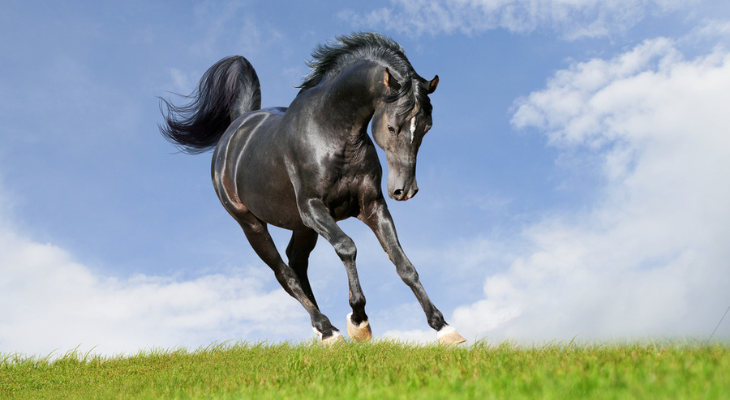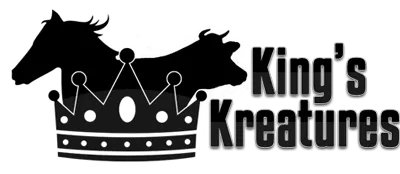
What Causes Nerve Damage in Horses?
Lameness, paralysis, muscle tremors, and even behavioral changes in horses can occur due to damaged nerves. Nerve damage happens for many reasons and can be caused by:
Vitamin E Deficiency
Horses that don't receive enough vitamin E in their diets are at increased risk for developing equine motor neuron disease (EMND). Older horses who've had the deficiency longer than 18 months are most likely to be diagnosed with EMND, according to UC Davis School of Veterinary Medicine.
EMND interferes with nerve signals to the muscles. Horses with the disease may show these signs and symptoms:
- Muscle Wasting
- Trembling Muscles
- Weight Loss
- Low Neck
- Raised Tail
- Weakness
- Sweating
Horses that have EMND may also shift their weight from side to side or lie down more often than usual.
Foaling
Increased pressure on the mare's nerves during foaling can cause symptoms ranging from muscle stiffness to paralysis. Nerve damage is more likely to happen due to prolonged labor, a narrow pelvis, or a large or deformed foal. Foals may also experience nerve damage during the birthing process. Symptoms vary depending on the site of the injury, but can include lameness, muscle wasting, stiffness, or head shaking. If the femoral nerve in the leg is damaged, the foal may not be able to stand.
Injuries
Any type of injury can damage the nerves. Horses that carry or pull heavy loads or collide with an object with their shoulders can develop suprascapular neuropathy, commonly called shoulder Sweeney. The injuries affect the suprascapular nerve responsible for shoulder muscle control. Damage to the nerve may cause muscle atrophy, shoulder instability and gait changes. As the horse walks, the shoulder dislocates, causing the unusual gait, according to Texas A&M School of Veterinary Medicine & Biomedical Sciences.
A fall could also damage your horse's spinal cord and cause gait changes. If the damage is mild, your horse may only have trouble stopping easily when walking or running. More severe damage could cause your horse to wobble when it walks.
Stringhalt
Stinghalt affects the nerves that control your horse's leg muscles. Horses that have stringhalt jerk their legs when walking. Australian stringhalt may occur if your horse eats toxic weeds in the pasture. An injury that damages the nerves controlling the rear leg muscles could cause classic stringhalt, although the cause of the classic form isn't always known.
Horses with nerve damage may also display changes in behavior, including bucking, kicking, or refusing to walk or accept a rider. When Colorado researchers reviewed autopsies of 14 horses euthanized for bad behavior, they discovered moderate to severe inflammation in nerve cells in the spine. Their research appeared in Frontiers in Veterinary Science.
Toxins
Weeds aren't the only toxins that could affect your horse's nervous system. Clostridium botulinum, a toxin that causes botulism, could affect horses that come in contact with rotting plants or animal carcasses. Symptoms can include partial paralysis, poor control of the head, and loss of reflexes in the legs.
Pesticides in fields could damage your horse's nerves. Eating grass, hay, or feed contaminated with pesticides or herbicides might cause muscle stiffness, loss of control of the limbs, muscle twitching, vomiting, diarrhea, and shortness of breath. Seizures, coma, and death may occur in severe cases.
Anesthesia
Femoral nerve damage can be caused by injuries or anesthesia used during medical procedures. Symptoms include changes in stride length, inability to support weight on the limbs, muscle wasting, and inability to extend the joint from the stifle.
Anesthesia doesn't cause facial nerve damage, but is a contributing factor. A paralyzed lip, drooping ear, or other symptoms can happen when the halter presses against the face during a procedure, according to the Merck Manual.
Do you think that your horse may have nerve damage? Prompt treatment is essential and increases the chances for recovery. Contact our office to schedule a visit with the equine veterinarian.
Sources:
Texas A&M School of Veterinary Medicine & Biomedical Sciences: The Rundown on Equine Shoulder Sweeney, 3/5/2020
https://vetmed.tamu.edu/news/pet-talk/the-rundown-on-equine-shoulder-sweeney/
UC Davis School of Veterinary Medicine: Equine Motor Neuron Disease (EMND), 4/15/2020
https://ceh.vetmed.ucdavis.edu/health-topics/equine-motor-neuron-disease-emnd#
Frontiers in Veterinary Science: Dangerous Behavior and Intractable Axial Skeletal Pain in Performance Horses: A Possible Role for Ganglioneuritis, 12/10/2021
https://www.frontiersin.org/articles/10.3389/fvets.2021.734218/full
American Association of Equine Practitioners: Is He Lame or Is He Neurologic? (Wobbler Syndrome), 2016
https://aaep.org/horsehealth/he-lame-or-he-neurologic-wobbler-syndrome
Merck Manual: Diseases of the Peripheral Nerves in Horses, 10/2022
Dressage Today: What Is Stringhalt and Can It Be Treated?, 11/4/2016
https://dressagetoday.com/horse-health/what-is-stringhalt-and-can-it-be-treated-53640/
